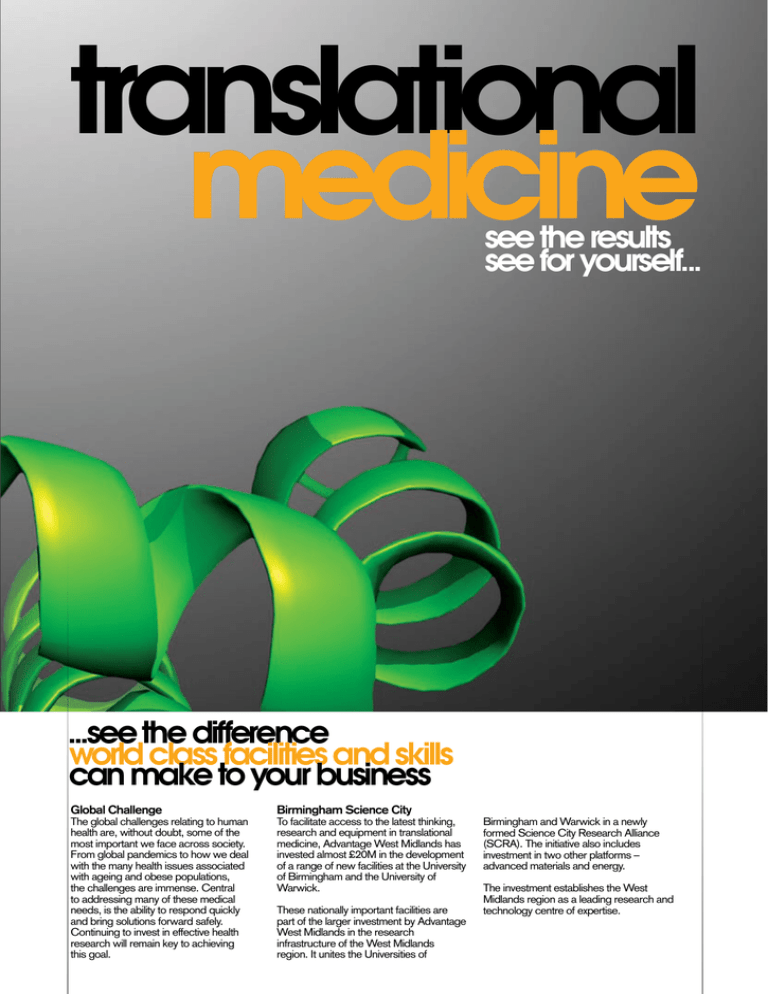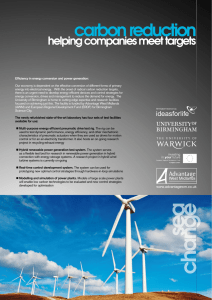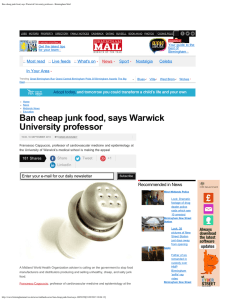translational medicine see the results see for yourself...
advertisement

translational medicine see the results see for yourself... ...see the difference world class facilities and skills can make to your business Global Challenge The global challenges relating to human health are, without doubt, some of the most important we face across society. From global pandemics to how we deal with the many health issues associated with ageing and obese populations, the challenges are immense. Central to addressing many of these medical needs, is the ability to respond quickly and bring solutions forward safely. Continuing to invest in effective health research will remain key to achieving this goal. Birmingham Science City To facilitate access to the latest thinking, research and equipment in translational medicine, Advantage West Midlands has invested almost £20M in the development of a range of new facilities at the University of Birmingham and the University of Warwick. These nationally important facilities are part of the larger investment by Advantage West Midlands in the research infrastructure of the West Midlands region. It unites the Universities of Birmingham and Warwick in a newly formed Science City Research Alliance (SCRA). The initiative also includes investment in two other platforms – advanced materials and energy. The investment establishes the West Midlands region as a leading research and technology centre of expertise. real tangible now Translational Medicine This project is led jointly by the University of Birmingham and the University of Warwick, but involves other important partners, including the Wellcome Trust, the Wolfson Foundation, the MRC and the NHS. It focuses on expanding and enhancing experimental research and clinical development in five therapeutically important areas: Total internal reflection fluorescent (TIRF) microscope at the University of Birmingham Cardiovascular Infection Metabolism Neuroscience Reproduction Underpinning these research themes, is excellence in clinical trials at both institutions. Getting Involved The aim of the project is to encourage industrial and academic collaboration in a range of research and development projects. It provides an opportunity for organisations to access internationally renowned expertise, state-of-the art equipment, and unique clinical facilities. The objective is to encourage more rapid development of new processes and treatments, and to ensure that the West Midlands region is positioned to benefit from future research investment in health. What Next To find out how your business could benefit from the programme, please contact: Dr Rubina Mian Business Engagement Manager – Experimental Medicine University of Birmingham B15 2SQ UK Dr Debbie Girdlestone Business Engagement Manager – Clinical Trials University of Warwick CV4 8UW UK Email: r.mian@bham.ac.uk Tel: +44 (0) 7795 207 888 Email: d.girdlestone@warwick.ac.uk Tel: +44 (0) 7824 541 198 Clinical Trials Unit at the University of Warwick Gait Laboratory at the University of Warwick Body composition imaging by DXA scanning in the Health Research Bus at the University of Birmingham (Images courtesy of GE Healthcare) human biomaterials the resource centre Human tissue samples and associated datasets represent a most valuable resource for scientists engaged in translational research. Access to such collections will undoubtedly aid the development of better diagnostic and prognostic tools, and new drug therapies. A human tissue bio-repository has been established at the University of Birmingham – the first of its kind in the West Midlands. The Human Biomaterials Resource Centre (HBRC) is dedicated to the collection and storage of appropriately consented, qualityassured biomaterials for distribution to biomedical research groups both in academia and industry. The Director of the HBRC is Dr Jane Steele who works in collaboration with local pathologists, surgeons and other hospital personnel to collect and catalogue the tissue. The HBRC offers access to existing sample collections, bespoke tissue collection and processing for specific research projects. This includes access to material from patients in a variety of disease settings; tissue which is surplus to diagnosis, waste material, additional samples taken for research purposes, and material taken from patients enrolled in clinical trials. The HBRC is licensed by the Human Tissue Authority and has been ethically approved, so investigators who access material will not need to apply for separate project-specific approval in the vast majority of cases. Human biomaterials are collected and banked in response to demand for existing research, and will also enable development in important future research areas – such as biomarker discovery programmes. The identification and cataloguing of clinical data alongside the tissue provides powerful insights into the nature and pathology of disease, and will inform future therapeutic strategies. Computational neuroscience at the University of Birmingham calorimetry the whole body concept Obesity and co-morbidities are two of the major public health concerns facing our society. The new Dual Whole Body Calorimeter (WBC) in Coventry is a landmark investment for research and development in this area. The system consists of two sealed rooms with a constant and measured supply of fresh air. The occupant’s rate of oxygen consumption and carbon dioxide production are measured to calculate their energy expenditure, through accurate continuous monitoring of the air composition within the room. This important facility will be used to understand how diet, physical activity and other aspects of behaviour – such as lifestyle and sleep patterns – all impact upon the ability to mitigate weight gain. Furthermore, due to its highly sensitive gas analyser, the WBC will enable us to measure small “Obesity is a major risk factor for Type 2 diabetes and therefore we are pleased to hear about the setting up of this facility which will help to advance research in this important area.” Dr Iain Frame, Director of Research, Diabetes UK changes in energy expenditure related to new drugs, food products and neutraceuticals. This facility will open up exciting opportunities to carry out research that we are currently unable to do – such as studying novel gaseous biomarkers for cancer, metabolic, gastrointestinal and respiratory diseases. The WBC will be under the direction of Professor Sudhesh Kumar as part of the Human Energy Metabolism and Body Composition Research Unit (BCRU) at University Hospital Coventry and Warwickshire. sea change www.birminghamsciencecity.co.uk Dr Filipa Vance Research Support Services University of Warwick CV4 8UW UK Email: f.vance@warwick.ac.uk Tel: +44 (0) 247 615 0204 Fax: +44 (0) 247 652 4991 Dr Claire Potter Research and Knowledge Transfer Office (MDS) University of Birmingham B15 2TT UK Email: c.potter@bham.ac.uk Tel: +44 (0) 121 414 8262 Fax: +44 (0) 121 414 7419



